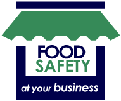Are you aware of food allergies?
With children starting school at this time of year, once again food allergies have made the headlines. Whilst we work with the other end of the age spectrum; food allergies are just as important in an aged care facility as they are in a school playground.
A food allergy is a reaction that a person gets when they come into contact with a particular food; this is different to a food intolerance or food dislike.
Allergic reactions can include visible marks on the skin, to diarrhoea, and in severe cases anaphylactic shock which is highly dangerous and requires immediate medical attention. The Food Standards Code has listed the allergens that must be controlled in a food safety program; these are listed below:
- Cereals containing gluten and their products, such as wheat, rye, barley, oats and spelt, as well as their hybridised strains
- Crustacea and their products
- Egg and egg products
- Fish and fish products
- Milk and milk products
- Peanuts and soybeans, and their products
- Added sulphites in concentrations of 10mg/kg or more
- Tree nuts and sesame seeds and their products, other than the coconut from the fruit of the palm cocos nucifera

These allergens represent approximately 90% of all allergic reactions; however each facility should be aware of the fact that a resident may be allergic to other foods.
Each facility must have a system that will identify possible allergens on receipt to the business, during storage, through production, and to service, so that they can be separated from other foods and any residents that are allergic to certain foods are not served these foods or any derivative of it.
The other thing that facilities need to be aware of is that allergies can be transferred from one food to another by using the same chopping board or utensils during production and service.
The catering staff in most aged care facilities are well aware as to which residents are allergic to certain foods and take appropriate action to ensure that these residents don’t get food they are allergic to, extra care must be taken when a new resident enters the facility and the dietary requirements may not be fully known.
function checkWholeForm(theForm) { var why = ""; if (theForm.EmailAddress) if (theForm.EmailAddress.value.length > 0) why += checkEmail(theForm.EmailAddress.value); if (theForm.CaptchaV2) why += isEmpty(theForm.CaptchaV2.value, "Enter Word Verification in box below"); if (why != "") { alert(why); return false; } return true; } //


